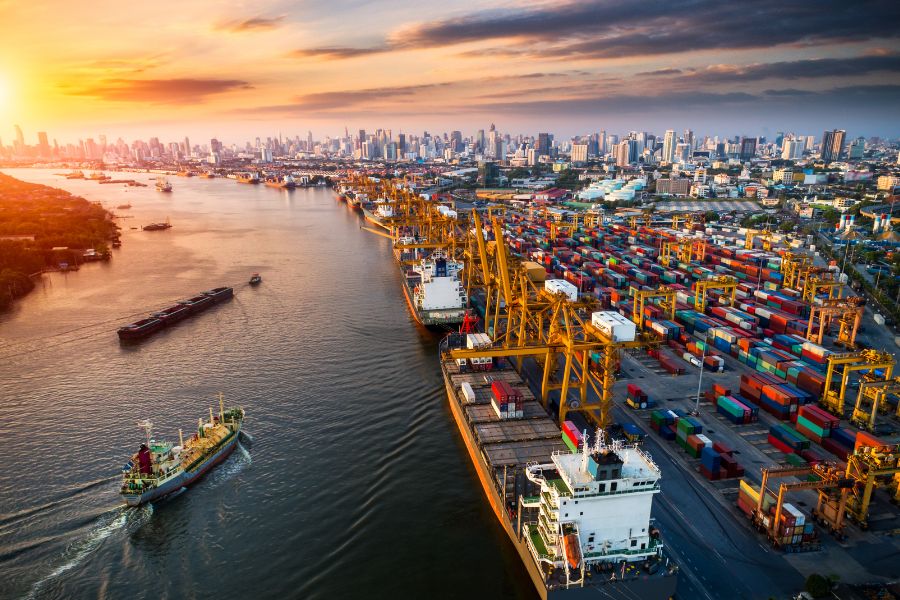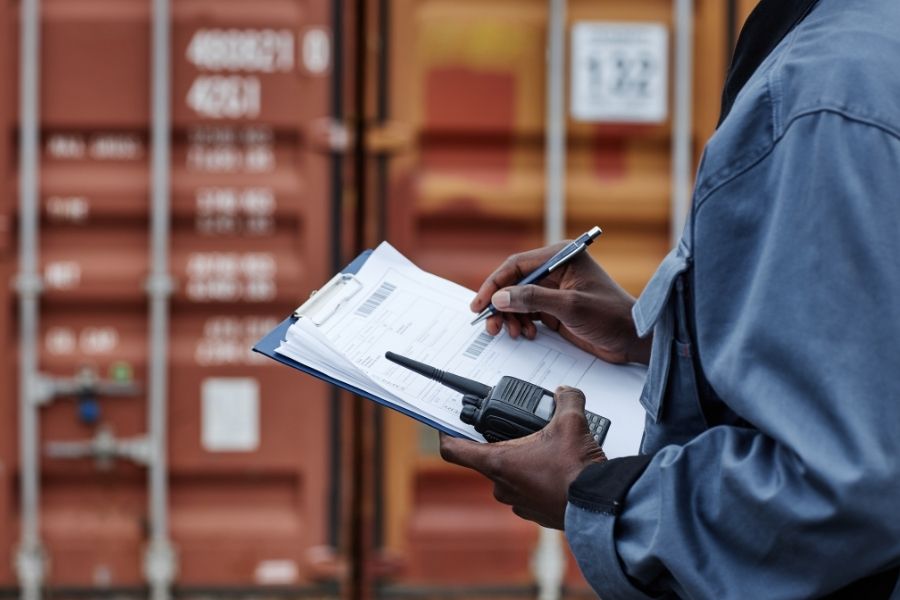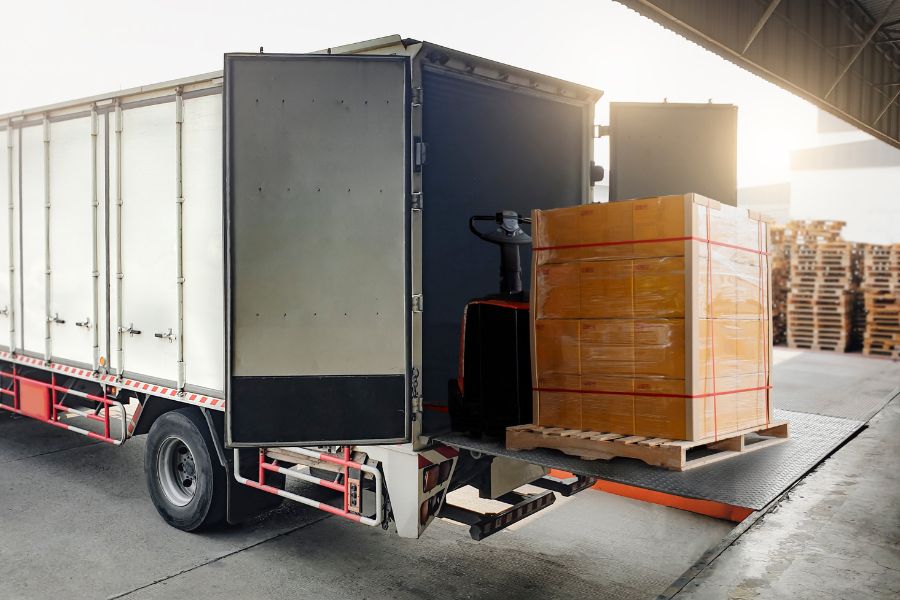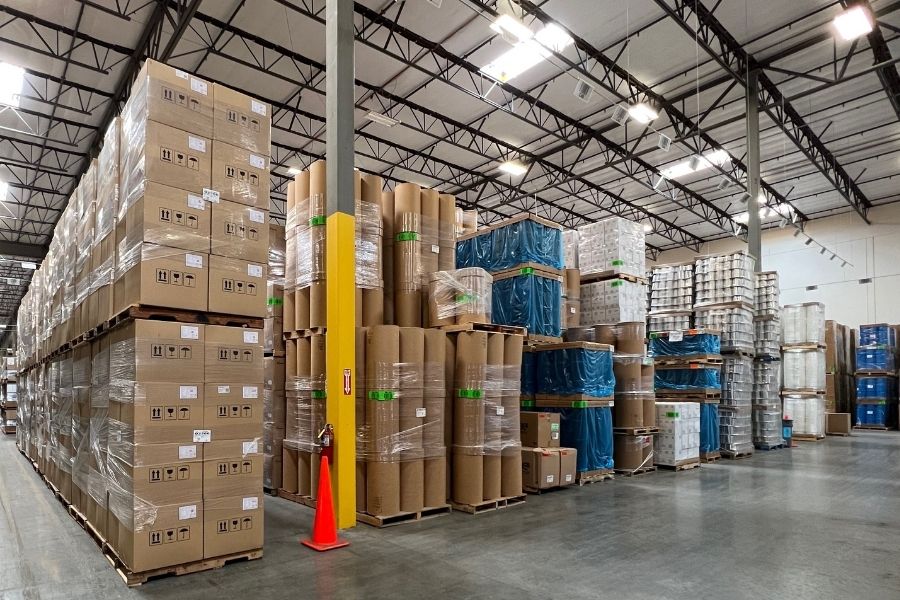Overcoming Packaging Supply Chain Risks

If your business sends products to customers, those products require proper packaging to arrive safely. Packaging is easy to forget about when planning a product, yet it’s a vital part of your customer service and business operations.
Packaging also plays an important role in branding and ensuring you are compliant with all the rules and regulations for your industry.
Just like any other aspect of manufacturing, packaging has its own supply chain. Understanding the risks involved in the packaging supply chain and integration of supply chain risk management will be essential to getting properly packaged products to your customers on time.
What is a Packaging Supply Chain?
The packaging supply chain refers to the intricate network of processes and entities involved in the journey of packaging materials and products, from their inception to the hands of the end user. This chain encompasses various components such as boxes, bottles, jars, closures, and more. It comprises not only the suppliers of raw materials but also the manufacturers and transportation providers responsible for the seamless movement of these materials and final products to their intended destinations. Just like any other supply chain, the packaging supply chain involves multiple stakeholders, and the efficient collaboration among these entities is essential in ensuring the timely delivery of packaging materials to companies that rely on them for their own product packaging needs.

Importance of an Efficient Packaging Supply Chain
The packaging supply chain is a secondary but integral component of a company’s supply chain. Disruptions within the packaging supply chain can have far-reaching consequences, hindering a company’s ability to deliver its products to consumers. An efficient packaging supply chain is instrumental in guaranteeing that a business consistently maintains a reliable supply of the packaging materials it requires for its product packaging. In the broader context of quality control and supply chain risk management, safeguarding the integrity of the packaging supply chain becomes an essential aspect of ensuring the uninterrupted flow of products to market.
Common Types of Supply Chain Risks in Packaging
Supply chains are continuously at risk of disruptions, and understanding the risks in the packaging industry is vital to lessening their impact. Here are some common concerns the packaging industry faces.
Raw Material Shortages
Raw materials, including the plastic, metal, paper, and glass used in packaging, can sometimes be in short supply. Factors such as economic concerns, production challenges, and even political situations can all have a detrimental impact on whether or not a raw material is available. Packaging manufacturers need raw materials to produce packaging products. To prevent a supplier disruption from affecting your business, maintaining a consistent and uninterrupted supply of raw materials can be a critical aspect of effective supply chain risk management.

Transportation Delays and Disruptions
Natural disasters, traffic delays, vehicle problems, and similar disruptions can all keep raw materials and finished packaging from getting where they need to go. While some of these can be potentially prevented through improved logistical planning or vehicle maintenance, some delays are inevitable. No one can control environmental risks, and a sudden snowstorm or other weather event can delay delivery times.
Quality Control Issues
Packaging products is a vital part of any business, and it is essential to ensure that the quality meets your high standards. Damaged or non-compliant packaging can render products unusable, so it is important to work with a reputable supplier that has strict quality control standards. This will help to minimize the risk of problems with packaging and ensure that your products arrive safely and in good condition.
Regulatory Changes and Compliance Challenges
Many types of products have regulations about how they must be packaged. For example, prescription medications require proper labeling and tamper-proof lids. These regulations and compliance concerns can change, which leads to delays when the packaging must be changed to meet new regulatory requirements.
Supplier Vulnerabilities and Disruptions
Supply chain risk factors also encompass vulnerabilities that pertain to the suppliers in the supply chain. When a supplier experiences economic instability or raises prices to offset inflation, it can lead to delays in the delivery of packaging materials to their intended destinations. Additionally, the geographical location of the packaging supplier may be at risk of extreme weather conditions that are not necessarily a concern for the company purchasing the packaging, thus introducing a shared susceptibility that poses risks for both parties.

What is the Impact of Packaging Supply Chain Risks for Companies?
These external risks can have various adverse effects on companies, ranging from setbacks in financial health to damaging their reputation with customers. Below, we’ll explore some of the most significant negative impacts that packaging supply chain concerns can entail.
Increased Costs and Budget Overruns
A supply-chain disruption can increase costs for the affected company. Having to find an alternate supplier for packaging, for instance, is a costly process. Ordering additional packaging increases the budget as well, which can cause companies to over-spend. Learning to manage this risk is one of the key strategies in reducing packaging costs.
Production Delays and Missed Deadlines
A lack of packaging materials causes production delays, and as previously mentioned, a company’s packaging is an essential part of its supply chain. When a business lacks the necessary packaging for its products, it results in the inability to fulfill customer orders, leading to missed delivery deadlines. These packaging-related issues in turn have a cascading effect on customer service, ultimately impacting a company’s reputation. Since supply chain disruptions, particularly related to packaging, are beyond the control of the product manufacturer, the ability to proactively plan for these missed deadlines is limited, resulting in potential harm to the business’s reputation.
Impaired Product Quality and Customer Satisfaction
If logistics issues lead to delayed or damaged packaging, the end product can suffer from quality issues as well. Improperly packaged products can be damaged in transit, risk moisture exposure, and may not be as visually appealing as those that are packaged properly. When a customer receives a damaged product due to a product packaging issue, their satisfaction can suffer and even result in the loss of their business.

Reputational Damage and Loss of Market Share
Damaged products and dissatisfied customers can harm the company’s reputation, even if the issue originates with the packaging supplier rather than the company itself. Customer discontent can result in a decline in business, leading to a loss of market share and exacerbating the negative consequences of supply chain risks for the company.
What is Packaging Supply Chain Risk Management?
Packaging supply chain risk management focuses on the packaging industry and all the chains involved in packaging. This process understands the specific risks of global supply chains and how those risks impact the production and delivery of packaging. Supply chain risk management encompasses protecting both buyers and packaging suppliers by carefully assessing such risks and creating plans to mitigate them.
How to Overcome Packaging Supply Chain Risks
Companies that procure packaging from third-party suppliers often risk a lack of control over the entire supply chain process. Regardless, due to budget constraints and logistical considerations, in-house packaging production is seldom a feasible option, requiring companies to accept this inherent risk. Fortunately, key strategies exist that organizations can utilize to reduce this risk and increase the likelihood of successfully receiving their packaging and delivering their products on time.
Diversification of Suppliers and Sourcing Locations
The global supply chain has the advantage of offering a wide range of suppliers for all types of materials, including packaging. By working with a diverse range of suppliers, the impact of external factors on one supplier may not result in a major organizational setback. In addition, maintaining multiple sourcing locations can help lessen some of the global supply chain risks, especially in the face of extreme weather events or climate change. If adverse weather conditions occur, the ability to shift operations to an unaffected location becomes a valuable contingency plan.

Enhanced Quality Control Processes
Collaborating with reliable packaging suppliers who prioritize the quality of their products can significantly reduce supply chain risks. It’s crucial for companies to do their due diligence and make informed decisions when selecting packaging suppliers, ensuring they have confidence in the supplier’s practices and procedures. As part of the supplier selection process, ask to see their quality control checklist to gain a better understanding of their commitment to quality and put yourself at ease with the contractual risks involved in partnering with a new supplier.
Collaboration and Communication with Suppliers
Businesses with packaging suppliers should maintain open communication regarding their requirements, and suppliers, in turn, should proactively inform their customers if they anticipate potential supply chain disruptions. Fostering such transparent communication is one of the best ways to curb supply chain concerns effectively.
Robust Risk Assessment and Monitoring
To reduce risk, it’s essential to understand what those risks are. Regularly assessing and monitoring risks that can be abated, like upcoming weather concerns, is a proactive approach to minimizing their adverse effects. Suppliers who are knowledgeable about potential risks can then make efforts to safeguard against them.
In this aspect of risk management, real-time monitoring and the application of artificial intelligence in logistics can be valuable. Utilizing the appropriate tools and predictive analytics software enables suppliers to anticipate a wider range of potential risks and take necessary measures to ensure packaging materials consistently reach manufacturers on schedule.
Development of Contingency Plans
It’s important to recognize that no risk can be entirely eliminated. To safeguard a business against the potential setbacks caused by supply chain management challenges, having a contingency plan in place is a wise strategy. A contingency plan serves as a backup, ensuring there’s an alternative route if issues arise in the supply chain. This preparation allows the company to maintain production and product delivery to its customers, even in the event of disruptions within the supply chain. Supply chain leaders understand that this contingency plan will help alleviate an organization’s negative impact when it comes to fulfilling customer orders.

Mitigating Supply Chain Risks with a Packaging Solutions Provider
The best practice to mitigate supply chain risks is choosing a packaging solutions provider that has the right technology and effective action plans in place to keep the packaging in production. Paramount Global has a long list of packaging services, including international freight forwarding, custom packaging solutions, sustainable packaging, and logistics help, to keep your company supplied with the packaging you need. We work with businesses of all sizes, offering exceptional customer service to each of our customers. Let us help you choose the right packaging or create packaging solutions that meet your needs, all while protecting yourself against supply chain concerns. Contact us today to get started.
Hayley is a marketing professional and copywriter with a background in crafting content for a diverse range of industries. She has been writing about packaging and supply chain logistics for Paramount Global since 2022. She specializes in explaining complex topics in a clear and engaging way and is an advocate for sustainability in packaging and supply chain management.
Read More
For over forty years, Paramount has been delivering perfectly integrated packaging and supply chain solutions.
